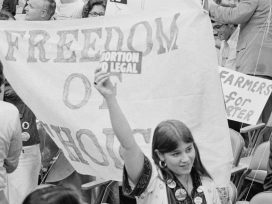Thibault Le Texier: Your recent lecture series at the Collège de France dealt with ‘economic democracy’. Can you explain the idea and why you chose to focus on it?
Alain Supiot: In France, one often speaks of ‘social democracy’, but rarely of ‘economic democracy’. Although the idea has a long history in Germany, it only emerged in France for a short period in 1982, in the Auroux Report on workers’ rights, where the aim was to bring citizenship into the company environment. The legislation resulting from this report was the last to have given serious consideration to labour law. Since then, we no longer speak of labour law but of the labour market. Labour law is in the hands of economists, who think that it will provide them with the key to full employment. Legal thinking has opted out of this debate.
Nevertheless, economic democracy remains an urgent question. At a time when managers are cut off from the experience of the people that they are managing, the only thing that can save them from losing touch with reality is economic democracy. But is it possible to see a company as a political entity – as a sort of mini-state – that can be democratized, whilst the state itself is increasingly thought of as a company? The answer is by no means obvious.
Both have features in common. The most important is that they are considered to be legal entities, as being subject to a particular kind of law. Like humans, companies and states are both endowed with their own will but, unlike humans, are not subject to mortality. However, if economic democracy is to exist, the social goal that companies pursue must not simply be the enrichment of their directors and shareholders. This is the condition that ensures that the power exerted within a company is not merely a system of domination. As such, it may be equated with the power institutionalized in a legitimate state.
Nowadays, the identification of companies with a social goal, a goal distinct from the interests of those who control or direct it, is tending to disappear. The reason for this what might be called the ‘financialization’ of the economy, which now treats money as an end in itself, rather than a means to an end.
Are you saying that it makes no sense to apply political concepts to companies?
You can only do so metaphorically and you have to take care not to confuse the two. Eminent jurists such as Paul Durand, author of the first major treatise on labour law in France, transposed concepts borrowed from constitutional law to companies. The three powers, executive, legislative and judicial, would equate, within a company, to the employer’s regulatory and disciplinary powers. But we must not lose sight of the features that distinguish the state from the company.
First, the distinguishing feature of the political sphere is that it deals with all aspects of public life. In particular, the state guarantees people’s lives, from birth to death, their living space and the territory in which they live; in short, it guarantees values that are truly unquantifiable. A company, however, is more or less mono-functional. It is essentially concerned with producing certain goods or supplying certain services. A mono-functional political system is not viable. This can be seen with the European Union, whose fatal mistake was to have made economics its founding principle.
Second, the state is the incarnation of the permanence of a people through succeeding generations. The preamble to the French constitution of 1946 reminds the world of what the French people already said back in 1789: ‘that every human being, without distinction of race, religion or creed, has sacred and inalienable rights’. In the case of a company, there is no equivalent of this immortal people. The company is focused upon an economic goal. Its staff are not a people, because the company may disappear and because any member of its staff can be dismissed at any time. It forms a labour ‘collective’, but one which is more and more divided by fragmentation in relation to salaries and the network organization of the company into an archipelago of distinct legal entities.
This community cannot be considered as a collection of individuals: if the company is to function, employees have to collaborate, work together, unite a group around a shared purpose. This implies a shared vision of the work to be done. What must be done to ensure that each individual shares this common vision? Taylorbelieved that the problem could be solved by reducing the worker to a robot-like agent. However, the dead ends that result from dehumanizing labour are clear enough.

Source: Depositphotos.com
When did the conflict between economic power and democracy appear?
The question of economic democracy appeared at the same time as the question of political democracy. For the Greeks, who invented it, the democratic order can only survive if it is founded on a fair division of labour. The reforms carried out by Solon – who lived six centuries before the common era – aimed at making independent work the basis of citizenship for the lowest classes of Athenians. But if political democracy necessarily has an economic dimension, it cannot be reduced to that. Confusing nations with vast enterprises, as was the case under communism and nowadays in neoliberal dogma, can only lead to the ruin of democracy, both political and economic.
Historically, the link between these two aspects of democracy is to be found during the medieval period, in the electoral processes carried out in monasteries and in the earliest merchant cities of Italy. Since they were sure that God’s people could not possibly get it wrong (vox populi, vox Dei), they saw a majority vote as a fiction of unanimity; the minority would, like it or not, have to go along with the decision. In order to solve the question as to whether the votes of the wisest and most experienced (the maior et sanior pars) ought to count for more, they invented qualified majorities. This qualitative dimension remains central if we are to think of democratization of power in companies. We must take into account not only the uneven distribution of attitudes and skills, but also the diversity of the practical experience of work.
The Middle Ages were thus the matrix in which the two pillars of modern democracy were created: electoral processes on the one hand and the contractual basis of power on the other. Both the medieval German Burg and the Italian città originally had an economic purpose. In the beginning they were fiefs to which the lord granted freedom, hoping thereby to attract commercial activities that would bring him profit.
How do you understand the concept of democracy?
Because it has been interpreted in so many different ways, the concept of ‘democracy’ has become almost unusable. The notion of assemblée de paroles put forward by Marcel Detienne is helpful in showing that democratic practices are not something peculiar to ‘our ancestors the Greeks’, but have their equivalents in other civilizations, notably in Africa. This enables us to grasp the question of democracy at its roots, at the point where we come to understand the constraints inherent in the symbolic life of our species. We are animals with language and have to ‘co-refer’, as Émile Benveniste puts it. In other words, we attribute to visible signs the same invisible meaning. This is why human societies cannot be considered merely as herds. We cannot form a society unless we subject ourselves to a shared reference, unless we obey a logic of ‘interdict’ that enables us to exchange words rather than blows. Looking at the question of democracy at this elementary level enables us to understand what it has in common with other forms of political organization, and what distinguishes it from them. What it has in common is the need for a shared reference and the logic of the interdict; what distinguishes it is the way in which such interdicts are imposed.
In the long history of humanity, these interdicts have generally been imposed on the vast majority by a small minority whose power derived from religion, tradition or, occasionally, brute force. Democracy originates from the rare practice of assembling to decide something together, as equals, in common. Hence the right of each member of an assembly to contribute to the formulation of the standard, by contradicting, if necessary, his peers’ opinions.
This does not mean that democratic institutions can manage without a hierarchy. On the contrary: what unites participants in an assemblée de paroles is consensus about what is true and fair, which can only be obtained through debate. This presupposes the ‘continual preference for the public interest rather than one’s own interest’, which Montesquieu, long after the Greeks, saw as the necessary condition for a democratic regime. Because it supposes a certain kind of self-renunciation – a renunciation, that is, of one’s own material interests – democracy necessarily has an economic dimension. This alone is what distinguishes political deliberation from commercial negotiation. A living democracy can be recognized by the fact that it places the common good at the pinnacle of its scale of values, well above personal enrichment.
How can economic power and political democracy be reconciled today?
Political democracy depends on a degree of economic equality. In L’Esprit des lois, Montesquieu writes the following:
In order to support this spirit, commerce should be carried on by the principal citizens; this should be their sole aim and study; this the chief object of the laws: and these very laws, by dividing the estates of individuals in proportion to the increase of commerce, should set every poor citizen so far at his ease as to be able to work like the rest, and every wealthy citizen in such a mediocrity as to be obliged to take some pains either in preserving or acquiring a fortune.
To reply to your question directly: increases in inequality are today undermining the foundations of political democracy. The revolutionaries in France or in America wanted to bring about a world made up of small owners making a living from their own work. They saw the frugal life of self-employed workers as the foundry for democracy: the experience of freedom in work would, they thought, nurture true citizens capable of self-government, of a form of autonomy built upon liberty, responsibility and concern for the public weal.
This ideal was upheld until World War II. In France, by Proudhon; in the US, by the jurist Louis Brandeis, who put forward the idea of the ‘curse of bigness’ that stifles political democracy and brings with it the curse of economic inefficacy. In India, Gandhi upheld similar views, especially in his Hind Swaraj, his manifesto on political emancipation.
However, the attempt to base democracy on self-employment failed. The formation of companies based on share capital sounded the death-knell for any democracy based on small-scale artisans and subsistence farmers. Companies could now concentrate enormous economic power whilst, at the same time, enjoying limited liability. This was incompatible with the notion of a society of equals who are equally liable. Georges Ripert, in his classic 1951 work on legal aspects of modern capitalism, speaks of them as ‘legal monsters’. Beginning as tools in the service of the state, public limited companies freed themselves in the latter half of the nineteenth century. Today they have seized power at a transnational level.
How have states reacted?
The first thing states can do is to break up economic power. Following the ideas of Montesquieu and Jefferson, anti-monopoly laws in the US like the Sherman Act (1890) and the Clayton Act (1914) aimed not only to regulate competition, but also to protect democracy. [Theodore] Roosevelt fulminated against what he called industrial dictatorship. ‘We know now,’ he said, ‘that government by organized money is just as dangerous as government by organized mob’. In Roosevelt’s view, ‘the liberty of a democracy is not safe if the people tolerate the growth of private power to a point where it becomes stronger than their democratic state itself’. In France, the National Council of the Resistance was to defend the same position. Ever since the liberal reforms of the 1970s, however, deregulation has been breaching the dykes built to contain economic power. It has enabled industrial and financial powers to impose their will on states, just as the internet giants or the financial institutions considered ‘too big to fail’.
The second strategy for keeping an economic power under democratic control is to increase the state’s economic power, in the form of nationalization or systematic intervention in the economy. This is what has happened in France. Here, however, the state has fallen victim to the curse of ‘bigness’. The counterbalance worked for a while, but today only states that are imperial in their dimensions, such as the US and China, can fight on this battlefield. The European Union could also have used its economic strength to impose its will on the big multinationals. But since it has neither political leadership nor a democratic base, what has actually happened is that it has succumbed to their power.
The success of this second strategy during the Trente Glorieuses should not disguise the change in the ideals of good government to which it led. Henceforth, good government was defined less in terms of justice than in economic efficacy. The criterion for citizenship was no longer liberty and equality in labour, but in consumption. One of the four freedoms proclaimed under the New Deal was ‘freedom from want’. This needs to be understood in both its social sense (freedom from poverty, unemployment and misery) and its economic sense (freedom from market forces in order to re-start the economy after WWII). Post-war Keynesianism had economic security as its sole aim; the idea of economic citizenship was allowed to fade out. Reduction in income inequality (measured by the Gini coefficient) – a necessary, but not exclusive condition of democracy – was at that time still a state goal. Since liberalization, successful policy is measure by only three ‘objective indicators’: GDP, the rate of inflation and the rate of unemployment.
A third way for the state to democratize economic power is to ensure that democracy enters the company. This does not mean giving political democracy supremacy over economic power. Rather, it means democratizing the latter by setting up opposing forces within companies. Thus, in France, the creation of works committees in 1945 gave employees the right to scrutinize the way they were managed. De Gaulle would have liked to turn them into organs for cooperation between capital and labour, but the Communist Party and the CGT opposed this. Instead of the German model of co-determination, they opted for a more political model, in which worker representatives have the right of consultation and control – in particular, through access to the company’s accounts. In many respects, the Auroux reforms fell into this category. They professed to be about ‘citizenship within the company’ and tried to place limits on economic power within the company without extending the exercise of this power to representatives of the labour force.
In the fullest sense of the term – that is, as an assembly of citizens, all acknowledged to be equal, deliberating over their common welfare – economic democracy can only be envisaged within the framework of cooperative businesses, whose employees are also shareholders. Aside from this, it is not possible to describe a company’s staff as a demos, the sovereign people. The employee is, by definition, legally and economically subordinate to the employer. This is why employee representation in France has always been carried out by external unions. Employee representatives have always been elected from union lists, and negotiations can only be carried out by union representatives.
This is the only basis capable of guaranteeing a certain balance of forces. Without it, the company will continue to be an autocratic structure. Democracy within the company can therefore be understood as co-management. The representatives of the workforce are placed on an equal footing with the shareholders in managing their common interests.
Is this the famous German model?
German legal culture conceives of society as an association of organized communities (Gemeinschaften) coordinated by the state. In the course of history, this communitarianism has oscillated between an authoritarian version – typified by Bismarck – and a democratic version already present in the thought of Otto von Gierke in the nineteenth century and in the theoretical writings on labour law by Hugo Sinzheimer at the beginning of the twentieth. Sinzheimer is the founding father of modern labour law; his appeal for the creation of economic democracy inspired the provisions of the Weimar Constitution on collaboration between employees and employers. Germany returned to this democratic concept after 1945 by introducing ‘co-determination’ (Mitbestimmung) into large companies, rather than nationalizing them as happened in France.
In Germany, the managers of a company are ideally chosen from among its staff and have mastered all the relevant skills. These managers form the board of directors and carry out their functions under the scrutiny of the workforce representatives and the shareholders, who form a supervisory council. The shareholders have the right to the last word, but the workers have their own assembly – the works committee, presided over by one of themselves (and not, as in France, by the employer), with a veto on certain decisions. It is not the Hartz labour market and welfare reforms at the beginning of the 2000s that explains German economic efficiency, but this communitarian culture – albeit combined with the comparative advantage of an undervalued euro and sub-contracting to eastern Europe.
This German social model is the one that has best withstood the wave of neoliberalism that began at the end of the 1970s. Co-determination acted as a brake on the implementation of ‘corporate governance’ methods, be it the ‘financialization’ of companies, in other words their reduction to objects of speculation, or the subjection of their management to the exclusive interests of shareholders, using techniques of remuneration that prioritized share-value rather than the long-term interest of the company.
Nowadays, it is not only that the largest companies that impose their interests on states. The states themselves also submit to the model of large companies, or rather to a caricature of that model. New Public Management, in fashion for twenty years, consists in applying the private sector management and accounting norms to the public sector. The Greek crisis showed how treating the state like a company can ruin a democracy: an entire country was placed under the supervision of administrators with no political responsibility. Its assets were liquidated and large sectors of its population were plunged into poverty. Greece, the birthplace of democracy in western culture, became a petri dish for post-democracy – the seedbed for demagogues of every stamp.
If I seem to be dealing in caricatures, it is because states grasp the worst aspects of the company model, namely self-assessment on the basis of short-term results and the assimilation of democracy to a ‘market for ideas’. They fail to recognize its best aspects, for example the ability to think long-term, one of the distinctive features of successful large companies.
What part can trade unions play in reconciling democracy and economic power?
The unions have many flaws. However, scorn for trade unions, currently so fashionable in the media and in politics, is a symptom of the collapse of democratic culture. Trade unions have retained a stronger link with the working class than any party or political movement and they continue to play an important representative role. Historically, it has been collective rights and collective bargaining that have given democratic expression to feelings of injustice and been the driver of social progress.
Historically, it was the trade unions that enabled workers to gain access to culture and to acquire the means to understand their economic situation. Unions had a double aim: educational and cultural. This is no longer the case. They have let themselves be locked into the role of negotiators over the price of the workforce. One way forward for trade unionism would be to re-connect with their educational and cultural mission and to ensure that we hear voices other than those of the media, which have fallen back under the spell of what the manifesto of the National Council of the Resistance called ‘financial power’.
Interview conducted 7 July 2017
Revised January 2018









